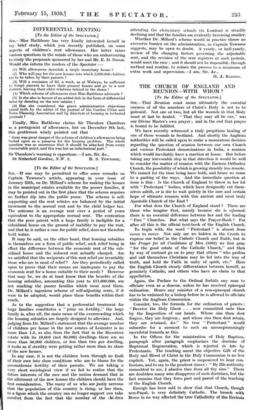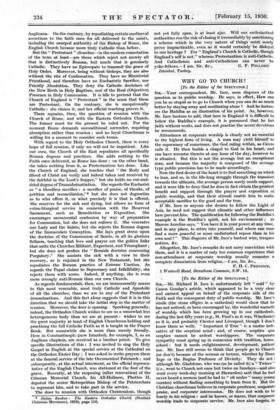THE CHURCH OF ENGLAND AND REUNION—WITH WHOM ?
[To the Editor of the SPECTATOR.]
SIR,—That Reunion must mean ultimately the essential oneness of all the members of Christ's Body is not to be gainsaid. Not one or two, but all the wounds in that Body must at last be healed. That they may all be one," was our Divine Master's own prayer ; and in the end that prayer is bound to be fulfilled.
We have recently witnessed a truly propitious healing of one of those wounds in Scotland. And shortly the Anglican authorities will be called upon to make a momentous decision regarding the question of reunion between our own Church and various Protestant denominations in India, a reunion which would inevitably have a reaction at home. But before taking any irrevocable step in that direction it would be well to consider the matter of reunion with the Eastern Orthodox Church, the possibility of which is growing steadily less remote. We cannot for the time being have both, and hence we come to a parting of the ways. And the immediate question at issue is this : Is the Church of England to throw in her lot with " Protestant " bodies, which have designedly cut them- selves adrift, or is she to wait quietly in the sure and certain hope of ultimate reunion with this ancient and most truly Apostolic Church of the East ?
For what does the Church of England stand ? There are those who imagine that, merely because she is reformed, there is no essential difference between her and the leading " Free " Churches. But what says the Prayer-Book ? For after all this is the official text-book of the English Church.
To begin with, the word " Protestant " is absent from
cover to cover. Not only are we bidden in the Creeds to express our belief in the Catholic Church and Faith, but in the Prayer for all Conditions of Men (1662) we first pray " for the good estate of the Catholic Church," and then by way of contrast go on to pray that others " who profess and call themselves Christians may be led into the way of truth, and hold the Faith in unity of spirit, etc." Here the English Church clearly differentiates between herself, as genuinely Catholic, and others who have no claim to that appellation.
Again, the Preface to the Ordinal forbids any man to officiate even as a deacon, unless he has received episcopal ordination. Hence any minister of a non-episcopal church has to be ordained by a bishop before he is allowed to officiate within the AnglicanCommunion.
Consider, too, the formula for the ordination of priests : " Receive the Holy Ghost . . . now committed unto thee by the Imposition of our hands. Whose sins thou dost forgive, they are forgiven ; and whose sins thou dost retain, they are retained, &c." No true " Protestant " would subscribe for a moment to such an uncompromisingly sacerdotal formula as this.
In the Offices for the ministration of Holy Baptism, paragraph after paragraph emphasizes the doctrine of Baptismal Regeneration, which is rejected in toto by Protestants. The teaching anent the objective Gift of the Body and Blood of Christ in the Holy Communion is no less explicit. Yet, again, the priest is empowered to hear con- fessions, and to say to the penitent sinner " By His authority committed to me, I absolve thee from all thy sins." There are doubtless many who disapprove of such doctrines, but the fact remains that they form part and parcel of the teaching of the English Church,
Enough has been said to show that that Church, though non-Papal, Is very definitely Catholic, The breach with Rome in no way affected the true Catholicity of the Ecclesia
Anglicana. On the contrary, by repudiating certain mediaeval accretions to the faith once for all delivered to the saints, including the usurped authority of the Bishop of Rome, the English Church became more truly Catholic than before.
But the " Protestant " churches—in the modern connotation of the term at least—are those which reject not merely all that is distinctively Roman, but much that is genuinely Catholic. They have no Episcopate to transmit the grace of Holy Order. Moreover, being without bishops, they are also without the rite of Confirmation. They have no Ministerial Priesthood, and therefore have no Eucharistic Sacrifice, nor Priestly Absolution. They deny the Catholic doctrines of the New Birth in Holy Baptism, and of the Real (Objective) Presence in Holy Communion. It is idle to pretend that the Church of England is " Protestant " in the sense that these are Protestant. On the contrary, she is unequivocally Catholic : she claims it, and her official teaching proves it.
There remains, then, the question of reunion with the Church of Rome, and with the Eastern Orthodox Church. The former must for the present be ruled out. For the moment Rome demands unconditional surrender, requiring absorption rather than reunion ; and no loyal Churchman is willing for a moment to consider such terms.
With regard to the Holy Orthodox Church, there is every hope of full reunion, if only we will not be impatient. Like our own, the Church of the East repudiates all specifically Roman dogmas and practices. She adds nothing to the Faith once delivered, as Rome has done ; on the other hand, she takes nothing from it, as Protestantism has done. Like the Church of England, she teaches that " the Body and Blood of Christ are verily and indeed taken and received by the faithful in the Lord's Supper," but she holds no cut-and- dried dogma of Transubstantiation. She regards the Eucharist as " a bloodless sacrifice : a sacrifice of praise, of thanks, of petition and reconciliation,"* but she does not dogmatize as to who offers it, or what precisely it is that is offered. She reserves for the sick and dying, but allows no form of extra-liturgical service in connexion with the Reserved Sacrament, such as Benediction or Exposition. She encourages sacramental confession by way of preparation for Communion, but she does not enforce it. She venerates our Lady and the Saints, but she rejects the Roman dogma of the Immaculate Conception. She lays greit stress upon the doctrine of the Communion of Saints, in all its glorious fullness, teaching that love and prayer are the golden links that unite the Churches Militant, Expectant, and Triumphant ; but she does not profess the " Romish doctrine concerning Purgatory." She anoints the sick with a view to their recovery, as is enjoined in the New Testament, but she repudiates the Roman practice of Extreme Unction. As regards the Papal claims to Supremacy and Infallibility, she rejects them with scorn. Indeed, if anything, she is even more strongly anti-Roman than our own Church.
As regards fundamentals, then, we are immeasurably nearer to this most venerable, most truly Catholic and Apostolic of all the churches, than we are to any of the Protestant denominations. And this fact alone suggests that it is in this direction that we should take the initial step in the matter of reunion. Moreover, the door is opening. Speaking generally, indeed, the Orthodox 'Church wishes to see us a somewhat less heterogeneous body than we are at present : wishes to see the great majority at least of English Churchmen holding and practising the full Catholic Faith as it is taught in the Prayer Book. But meanwhile she is more than merely friendly. Here in Constantinople (now Istanbul), for example, I, as an Anglican chaplain; am received as a brother priest. To give specific illustrations of this : I was invited to sing the Holy Gospel in English at the special service at the Cathedral on the Orthodox Easter Day ; I was asked to recite prayers there at the funeral service of the late Oecumenical Patriarch ; and subsequently, at the actual interment, as the official represen- tative of the English Church, was stationed at the foot of the grave. Recently, at the reopening (after renovation) of the Crimean Memorial Church, his All-Holiness, Photius II, deputed the senior Metropolitan Bishop of the Patriarchate to represent him, and to take part in the service.
The door to reunion with Orthodox Christendom, though
• Stefan Zankov : The Eastern Orthodox Church (Student Christian Movement, 1929), page 115.
not yet fully open, is at least ajar. Will our ecclesiastical authorities run the risk of closing it irremediably by sanctioning a scheme which in the very nature of things must surely prove impracticable, even as it would certainly be disloyal to our heritage ? For " England's Church is Catholic, though England's self is not," whereas Protestantism is anti-Catholic. And Catholicism and anti-Catholicism can never be
yoke-fellows.—I am, Sir, &c., . G. F. POLLARD Istanbul, Turkey.











































 Previous page
Previous page